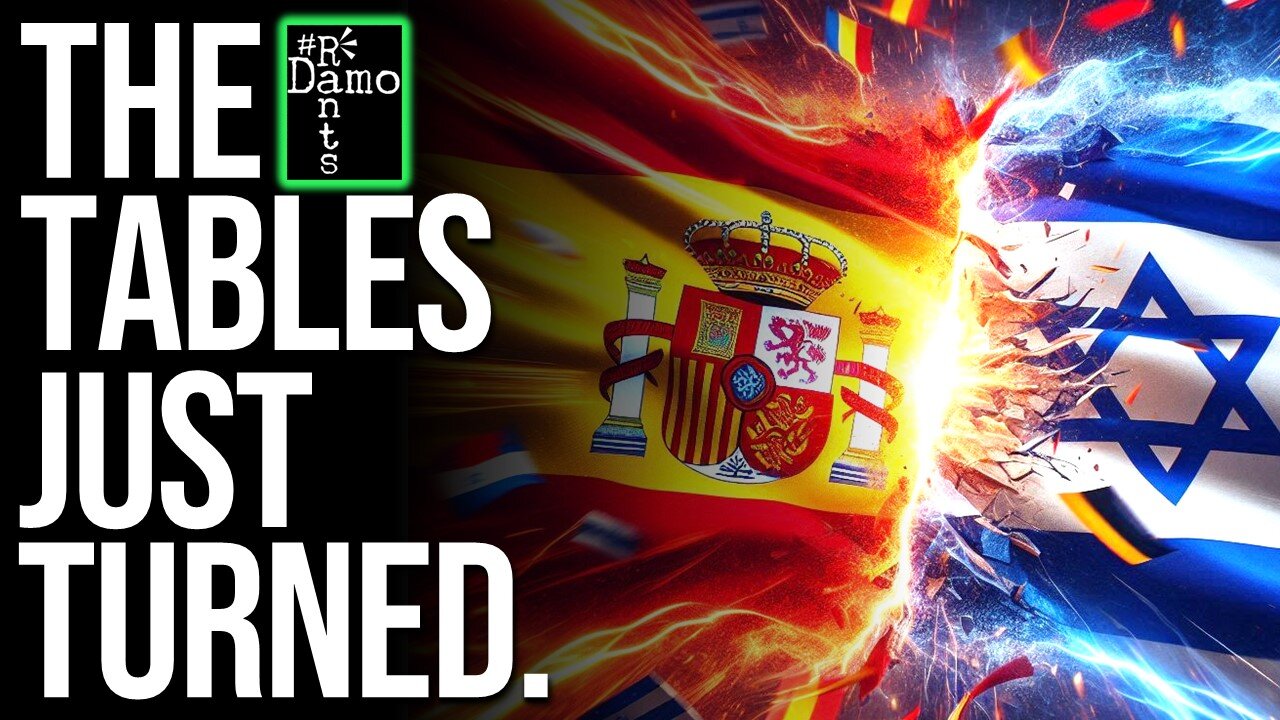Premium Only Content

Netanyahu Thought He Was Safe - Spain Decided Otherwise
Right, so Israel as we know does like to treat international waters as its private security zone—but this time, it’s not activists they’ve dragged off a ship, it’s themselves into a courtroom. When Spanish citizen Sergio Toribio climbed aboard the Madleen, the most recent Freedom Flotilla vessel to try to reach Gaza, detained in international waters as that ship was, he’s now getting his own back perhaps, and possibly be about to make legal history. You see, following Israel’s armed raid on that Gaza-bound humanitarian vessel in last month, Spain has launched a war crimes investigation into top Israeli officials, including Prime Minister Benjamin Netanyahu. As the Freedom Flotilla prepares to launch its next mission aboard the Handala, due to set sail next week, the Mediterranean isn’t just a battleground for aid and resistance—it’s become the frontline of a growing global legal revolt against Israeli impunity.
Right, so Israel might think the Eastern Med is theirs to dominate, but this time, the waves are carrying subpoenas, as they get bitten in the backside for their illegal raid last month on the Madleen — that civilian aid ship bound for Gaza, the latest mission as that was for the Freedom Flotilla — and it did more than detain human rights activists and provoke international condemnation. It has now triggered legal action in the halls of Spain’s highest criminal court. Spain’s Audiencia Nacional has launched a war crimes investigation into Prime Minister Benjamin Netanyahu, Foreign Minister Israel Katz, and other top Israeli military commanders.
What was once written off as activism is now gaining the full weight of legal legitimacy and its about time. And just as the Freedom Flotilla Coalition prepares to launch the Handala, their next humanitarian ship to Gaza, this new legal move and the precedent it might well set may not only shield activists going forwards in a way the crew of the Madleen were not, but finally hold to account Israeli officials long accustomed to getting away with absolute impunity.
The Madleen, was boarded by Israeli commandos in international waters on June 1. On board were peace activists, medics, journalists, and high-profile figures such as Greta Thunberg and French-Palestinian human rights advocate and Member of the European Parliament Rima Hassan. The raid resulted in the detention and mistreatment of crew members, with confiscated aid that Israel made sure never reached its destination.
In response to that, Spanish activist Sergio Toribio — who was on board — filed a legal complaint alongside the Committee for Solidarity with the Arab Cause (CSCA). As confirmed by HuffPost España and Anadolu Agency, Spain’s Audiencia Nacional formally opened a criminal probe into top Israeli officials under the doctrine of universal jurisdiction. The charges range from war crimes and torture to crimes against humanity and attacks on a protected humanitarian mission.
Universal jurisdiction is a principle in international law that allows a state to prosecute serious crimes—such as genocide, war crimes, and crimes against humanity—regardless of where they were committed or the nationality of the perpetrators or victims, which is particularly relevant given the array of nationalities that were represented on the Madleen. The doctrine was developed in response to atrocities like the Holocaust and apartheid and reflects a moral imperative: some crimes are so egregious that they offend all humanity, hence the ability to try such crimes anywhere.
Spain’s 1985 Organic Law on the Judiciary included provisions for universal jurisdiction, and it became a pioneer in using the principle to pursue international crimes and so it is leading the way again now. It was the Spanish courts that issued the infamous arrest warrant for Chilean dictator Augusto Pinochet in 1998. However, diplomatic pressure—especially from the US and Israel—forced Spain to curtail these powers in 2009. That the Spanish judiciary has now chosen to invoke this principle again in the case of Gaza signals not only a bold legal manoeuvre but a significant reversal of a long-standing retreat from accountability – as long as it is more than just for show, which needs to be seen of course.
The legal basis for the Madleen probe rests on the participation of a Spanish citizen—Sergio Toribio—aboard the ship, giving Spain both personal and universal jurisdiction over the matter. But by invoking broader crimes against humanity, Spain is signalling that the case extends beyond individual harm and into the realm of international concern.
For Gaza, the Spanish case represents a rare opening in an otherwise hermetically sealed wall of impunity. Over 57,000 Palestinians have been killed since October 2023 – officially, but many more than that remain missing, many of them children. Civilian infrastructure has been bombed. Hospitals, schools, and bakeries have been targeted. Despite extensive documentation by UN bodies, NGOs, and journalists on the ground, accountability has remained elusive, in no small part due to Israeli and US leverage on other governments.
Spain’s war crimes probe shifts that narrative and pushes back against that influence, which Spain itself has come under before. It recognises that violence against Palestinians and those who attempt to assist them is not simply unfortunate or another ‘bad news’ news story relating to Gaza—it is a criminal enterprise. The case legitimises Palestinian suffering within an international legal framework and reasserts the global community’s responsibility to intervene, if not militarily, then judicially.
It also sends a signal to international humanitarian workers: they are not alone, and their sacrifice will not be ignored. The legal recognition of the Madleen crew’s ordeal sets a precedent that may embolden more aid workers to speak out, participate in legal action, and document abuses for future trials.
For Israel, and particularly for Netanyahu, the implications of the Spanish case are nothing short of disastrous. While Israel has previously relied on US backing, diplomatic shielding at the UN, and the refusal of Western states to enforce international law, this probe breaks through all of that protection.
If Spain follows through with arrest warrants, Netanyahu and other officials will face real travel restrictions. Spain is a member of the European Union and Schengen Area. Any EU state recognising a Spanish-issued warrant could detain Israeli leaders. Moreover, Spain’s cooperation with the ICC could strengthen the enforcement of that Court’s arrest warrants, expanding the geography of legal threat – though obviously the same caveat applies here as it does with regards to the lack of willingness shown by several ICC signatory states to have enforced those arrest warrants on Netanyahu when he has either visited a European state or used its airspace.
The case also threatens Israel’s public relations narrative. By targeting a humanitarian mission, Israel is now legally accused not merely of excessive force but of systematically criminalising and attacking aid delivery on top of the list of crimes they are racking up in relation to their war of starvation on Gaza, reframing its blockade not as a security measure but as a potential war crime.
For Netanyahu personally, the Spanish probe adds another layer of legal peril atop domestic corruption charges and the ICC arrest warrant. It paints a picture of a leader not just isolated diplomatically but increasingly cornered judicially.
To fully grasp the significance of the Spanish case, it is worth reflecting on the long history of failed accountability mechanisms involving Israel and international law previously and why this one is different. For decades, legal action against Israeli officials has either been thwarted by geopolitical pressure or quietly abandoned.
In 2010, the case of the Mavi Marmara stands out as a prime example. Israeli commandos stormed the Turkish-led flotilla in international waters, killing ten civilians, the first Freedom Flotilla attempt to break the siege of Gaza as this was. Turkey pursued legal remedies, and the ICC was petitioned. Yet despite the gravity of the attack, the ICC prosecutor declined to pursue the case in 2014, citing lack of sufficient gravity to warrant action. The decision was widely criticised by human rights groups as politically motivated and knowing as so many more of us do now of the influence of Israeli interests in foreign governments, this strikes a chord with many more people today I would suggest than it did at the time.
Similarly, in 2009, Spain attempted to use its universal jurisdiction powers to investigate Israeli officials over the 2002 bombing of Salah Shehadeh in Gaza, which resulted in 15 civilian deaths. That case was abruptly closed after intense pressure from Israel and the United States. The Spanish government amended its jurisdiction laws soon after, severely limiting such actions—until now.
In the UK, also in 2009, former Israeli Foreign Minister Tzipi Livni was issued an arrest warrant by a British court over war crimes during Operation Cast Lead. To prevent diplomatic fallout, the UK government swiftly changed its laws to require the consent of the Director of Public Prosecutions before such warrants could be issued. This was again under a Labour government and the Director of Public Prosecutions at that time was a certain Keir Starmer. Cue no surprise whatsoever.
Belgium, who were once also a global pioneer in universal jurisdiction, faced a similar climbdown. It had accepted a war crimes complaint against former Israeli Prime Minister Ariel Sharon for his alleged involvement in the 1982 Sabra and Shatila massacre. But facing US threats to relocate NATO headquarters out of Brussels, Belgium gutted its universal jurisdiction law in 2003.
In each case, the pattern was the same: legal ambition met geopolitical backlash from the same state actors. But the Spanish case marks a break from this cycle. It signals that a new era may be emerging—one in which legal institutions are willing to withstand pressure, reassert their mandates, and challenge impunity not only in rhetoric but through judicial process.
In November last year, the International Criminal Court (ICC) Prosecutor Karim Khan made global headlines when he formally requested arrest warrants for Israeli Prime Minister Benjamin Netanyahu and the then Defence Minister Yoav Gallant. The charges as wel ought to know by now including war crimes and crimes against humanity in the context of Israel's war on Gaza. The allegations encompass the starvation of civilians as a method of warfare, willful killing, and the targeting of aid and rescue workers—charges that align rather neatly with those being pursued in the Spanish case over the Madleen.
While Israel is not a signatory to the Rome Statute, the ICC’s founding treaty, its officials can still be held accountable for crimes committed on the territory of Palestine, which acceded to the Rome Statute in 2015. Moreover, more than 120 countries are parties to the ICC, meaning that if Netanyahu or Gallant sets foot in any of these states, they could legally be detained and transferred to The Hague, though again, we’ve seen this not being enforced, which undermines proceedings immensely, it is deeply harmful to the principle of international law when nations do this, but we’re seeing the opposite happening here.
Spain’s domestic case actually strengthens the ICC’s position in multiple ways though. First, it adds evidentiary and testimonial weight to the overarching charge that Israel’s conduct is part of a systematic and sustained policy, not merely isolated incidents. Second, it expands the legal pressure beyond the ICC alone. By invoking universal jurisdiction at the national level, Spain reduces the ICC’s isolation and lends it the legitimacy of a parallel legal mechanism. This also enhances enforcement potential: if the ICC warrants go unheeded, Spanish warrants might succeed where others have failed, especially within the European Union.
Furthermore, the Spanish court’s willingness to act could prompt other nations—particularly in Europe or Latin America—to revive their own dormant universal jurisdiction laws. Should more national jurisdictions align with the ICC's investigation, Israel could find itself surrounded not only by hostile public opinion, but by an international legal architecture that threatens to severely limit the mobility of its leadership and diplomatic corps. This would go some way to reversing the damage caused by Netanyahu visiting Hungary unimpeded and the use of the airspace of other nations, such as Greece without consequence.
In this way, the Spanish and ICC actions are not in competition but working in concert, representing a coordinated judicial front that finally challenges the notion that Israeli officials operate beyond the reach of international law.
And it is into this shifting legal terrain that the Handala sets sail, the Freedom Flotilla Coalition’s next civilian aid vessel, set to depart on July 13. Like its predecessor, the Madleen, it carries humanitarian aid and international peace activists determined to breach Israel’s illegal naval blockade and deliver supplies to the people of Gaza, raising awareness as it is doing so, increasingly so off the back of the high profile Madleen voyage and this case beginning in Spain. That makes this trip different though - because unlike its predecessors, the Handala now sails with the protective wind of a judicial precedent in its sails.
You see the Spanish war crimes investigation significantly alters the risk calculus for Israel as they are faced with another Freedom Flotilla vessel. Any future attack on the Handala could be viewed not as an isolated incident but as a continuation of a pattern of criminal behaviour—one that now carries legal consequences. By launching its probe, Spain has sent a clear message: the era of consequence-free raids on humanitarian missions by Israel may be coming to an end.
Should Israel intercept the Handala, it will not only risk intensifying its diplomatic isolation, but it will hand legal teams and human rights advocates across Europe and beyond fresh evidence to supplement existing and emerging cases. The Freedom Flotilla Coalition is already preparing to document every second of the voyage, every interaction, and every confrontation. That footage, combined with eyewitness testimony and international media coverage, would strengthen the evidentiary base of both the Spanish case and the ICC investigation.
The presence of European nationals on board the Handala further compounds the stakes. Countries whose citizens are detained, mistreated, or injured, as evidenced by the treatment of the Madleen crew, may feel compelled to act diplomatically or judicially. Spain’s example provides a template: rather than issue hollow condemnations, states can now invoke universal jurisdiction and pursue legal redress and should feel more emboldened to do so.
Moreover, the Handala mission benefits from the growing legitimacy of its cause. Once dismissed by mainstream media as fringe activism, the flotilla’s objectives are now being recognized within formal judicial systems as aligned with international humanitarian law. Spain’s case helps reframe these activists not as provocateurs, but as frontline human rights defenders facing the brute force of a state engaged in blockade and siege warfare.
In essence, the Spanish legal action has transformed the Handala from a symbolic gesture into a tactical vessel of accountability. Should it succeed in reaching Gaza, it would represent a moral and strategic victory. Should it be intercepted, it may end up accelerating the legal exposure of Israel’s leadership. In either case, the voyage is no longer just a protest—it is a provocation backed by legal principle, humanitarian necessity, and international attention.
The convergence of Spain’s war crimes investigation, the ICC’s historic arrest warrants, and the renewed vigor of humanitarian missions like the Handala marks a watershed moment in the long battle for justice in Palestine. After decades of silence, double standards, and failed prosecutions, the tide may finally be turning—not through the force of arms or the grace of diplomacy, but through the slow, grinding assertion of international law.
For too long, Israel has operated with impunity—shielded by powerful allies and excused by institutions unwilling to enforce their own statutes. Cracks in that are beginning to show though and will hopefully widen. Spain’s probe challenges the notion that aid workers and civilians are fair game, that violations in international waters carry no penalty, and that the law is a privilege of the powerful.
For Palestinians, the implications could be profound. It offers the rare prospect of justice pursued through courts which carry weight rather than slogans with no weight at all. For international activists, it transforms symbolic acts into legally potent resistance. And for Israel and Netanyahu, it points to a future in which power may no longer shield them from the consequences of their actions.
In the courtroom and on the open sea, a new form of resistance is taking shape—one that combines courage with codified principle and defiance with documentation. The Handala may or may not reach Gaza. But thanks to Spain’s legal awakening, its voyage already carries more weight than any single ship has in years, including the Madleen. For once, the law may be sailing in the right direction.
The timing of this voyage and this legal move couldn’t be more critical though, as Israel once more moves towards mass forced displacement, as the aforementioned accused in the Spanish court case, Israel Katz, now talks of creating a Humanitarian City on the ruins of Rafah, but which on every metric more closely resembles a Warsaw Ghetto from 1930’s Europe, so far from being humanitarian, it should be called exactly what it is – a concentration camp. Get all the details of that horrifying story in this video recommendation here as your suggested next watch.
Please do also hit like, share and subscribe if you haven’t done so already so as to ensure you don’t miss out on all new daily content as well as spreading the word and helping to support the channel at the same time which is very much appreciated, holding power to account for ordinary working class people and I will hopefully catch you on the next vid. Cheers folks.
-
 LIVE
LIVE
SpartakusLIVE
11 hours agoREDSEC BATTLE ROYALE || Battlefield 6 w/ The Boys
189 watching -
 1:03:22
1:03:22
TheCrucible
3 hours agoThe Extravaganza! EP: 61 with Guest Co-Host: Rob Noerr (10/28/25)
74.9K8 -
 LIVE
LIVE
LFA TV
23 hours agoLIVE & BREAKING NEWS! | TUESDAY 10/28/25
660 watching -
 3:11:15
3:11:15
Nikko Ortiz
4 hours agoBATTLEFIELD 6 NEW BATTLE ROYAL REDSEC... |Rumble Live
2.92K2 -

StoneMountain64
10 hours agoBattlefield REDSEC Battle Royale GAMEPLAY & 1st Impressions (Free to Play LAUNCH DAY)
67.3K -
 1:33:39
1:33:39
Michael Franzese
4 hours agoThe Real Donnie Brasco: REVEALS Why Joe Pistone Stole His Name
30.6K1 -
 1:12:46
1:12:46
Candace Show Podcast
4 hours agoCharlie Ripped A Hole In Reality | Candace Ep 253
81.6K153 -
 LIVE
LIVE
Tundra Tactical
4 hours agoProfessional Gun Nerd Plays Battlefield 6
32 watching -
 LIVE
LIVE
NAG Daily
1 hour agoBOLDCHAT: with ANGELA BELCAMINO
12 watching -
 LIVE
LIVE
Blabs Games
9 hours agoFirst Time Playing Jurassic World Evolution 3
46 watching